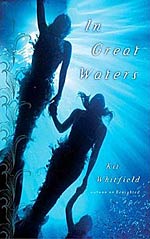
![]() pling
pling
2/23/2014
![]()
This book took a while to get going for me, then I found the end disappointing and too neatly tied up for my tastes. In this alternate history merpeople are real and the kings & queens of Europe are descended from a hybrid, who took control of Venice back in the day. Every non-landlocked country wants a hybrid ruler because then they can get their coastal merpeople to stop invasions from other countries. The merpeople (who are never referred to as that, they are deepsmen) aren't quite intelligent although they have language and are almost "human". Because the royal families all descend from one woman, and so have been interbreeding for several generations they have all sorts of health issues. But "bastards" i.e. non-royal-family hybrids are strictly forbidden & burnt to death if found.
The story is seen from two points of view - Henry, a bastard brought up by deepsmen for the first few years of his life before being cast out, and Anne, youngest daughter of the current English royal family which is in the midst of a succession crisis. I think one of my problems with getting properly sucked into the book is that Henry is pretty alien in perspective (good in theory, but didn't help me get immersed) and Anne spends most of the book being a passive observer (not even always seeing enough to be sure what's going on). So the story seemed to happen off the page for the first two thirds of the book, then suddenly our two characters are the centre of it all and everything gets resolved. And I think the implications are that we all live happily ever after, except for those who don't. And I just don't buy that.
I did like the pseudo-Tudor court with its paranoid politics. I also liked the way Henry goes through culture shock when he gets kicked out of his deepsman life into a landsman life - and never quite gets over his upbringing even if he gets socialised to some degree. It felt real and made for an interesting character. Just it was hard to sympathise with him and made the first few chapters which are solely his point of view more difficult to get invested in. Whereas Anne was sympathetic (and again felt real) but given it's a plot point that she projected an image of being a bit "simple" in public there's a lot of watching things happen around her.